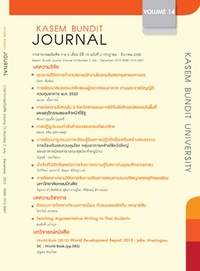การสังเคราะห์งานวิจัยการจัดการเรียนการสอนตามแนวปรัชญาเศรษฐกิจพอเพียง มหาวิทยาลัยเกษมบัณฑิต
Keywords:
สังเคราะห์งานวิจัย, การจัดการเรียนการสอนตามแนวปรัชญาเศรษฐกิจพอเพียง, Synthesis of researches, Learning and instruction based on the Philosophy of Sufficiency EconomyAbstract
การวิจัยครั้งนี้มีวัตถุประสงค์เพื่อ 1) วิเคราะห์ระเบียบวิธีวิจัยการจัดการเรียนการสอนตามแนวปรัชญาเศรษฐกิจพอเพียง มหาวิทยาลัยเกษมบัณฑิต 2) สังเคราะห์รูปแบบการจัดการเรียนการสอนตามแนวปรัชญาเศรษฐกิจพอเพียงโดยใช้วิธีการวิเคราะห์เนื้อหา (Content Analysis) 3) เพื่อสรุปภาพรวมของงานวิจัยการจัดการเรียนการสอนตามแนวปรัชญาเศรษฐกิจพอเพียง มหาวิทยาลัยเกษมบัณฑิต ทั้งในด้านของระเบียบวิธีวิจัยและรูปแบบการจัดการเรียนการสอน
ประชากร คือ งานวิจัยการจัดการเรียนการสอนตามแนวปรัชญาเศรษฐกิจพอเพียงระดับปริญญาตรี ของมหาวิทยาลัยเกษมบัณฑิต ที่จัดทำขึ้นระหว่างปีการศึกษา 2550 -2554 จำนวน 4 เรื่อง ได้แก่ การพัฒนารูปแบบการเรียนการสอนตามแนวปรัชญาเศรษฐกิจพอเพียงรายวิชาการบัญชีชั้นกลาง 2 (AC 307) การพัฒนารูปแบบการเรียนการสอนตามแนวปรัชญาเศรษฐกิจพอเพียงรายวิชา การเงินธุรกิจ (FB 201) การพัฒนารูปแบบการเรียนการสอนตามแนวปรัชญาเศรษฐกิจพอเพียงรายวิชาสัมมนากรณีศึกษาด้านประชาสัมพันธ์ (PA 412) และการศึกษาประสิทธิผลการจัดการเรียนรู้รายวิชาเศรษฐกิจพอเพียงกับคุณภาพชีวิต (ศท. 124) ผลการวิจัยสรุปได้ดังนี้
1.ระเบียบวิธีวิจัยและผลการวิจัย
1.1 งานวิจัยทั้ง 4 โครงการ ดำเนินการวิจัยแบบ การวิจัยกึ่งทดลอง และการวิจัยเชิงพรรณนา
1.2 เครื่องมือวัดตัวแปร งานวิจัยกึ่งทดลอง ทั้ง 3 เรื่อง เป็นเครื่องมือวัดสมรรถนะความพอเพียง ส่วนงานวิจัยเชิงพรรณนา 1 เรื่อง เป็นเครื่องมือวัดความสุขในการเรียนรู้ เครื่องมือวัดตัวแปรที่สร้างขึ้นทั้งหมด มีการหาคุณภาพด้วยการหาค่าความตรงเชิงเนื้อหา ค่าอำนาจจำแนกรายข้อ และค่าความเที่ยงทั้งฉบับ
1.3 การใช้สถิติและเทคนิคการวิเคราะห์ข้อมูล งานวิจัยทั้ง 4 เรื่อง ใช้สถิติพรรณนา คือ ค่าเฉลี่ย และส่วนเบี่ยงเบนมาตรฐาน และใช้สถิติอ้างอิง t – test ทดสอบความแตกต่าง และหาค่าสัมประสิทธิ์สหสัมพันธ์ด้วย Pearson Product Moment Correlation
1.4 ผลการวิจัย
งานวิจัยกึ่งทดลองทั้ง 2 เรื่อง ที่มีกลุ่มควบคุม สมรรถนะความพอเพียงสูงขึ้นหลังการทดลอง และสมรรถนะความพอเพียงของกลุ่มทดลองสูงกว่ากลุ่มควบคุม โดยงานวิจัยกึ่งทดลอง 1 เรื่อง ที่ไม่มีกลุ่มควบคุม สมรรถนะความพอเพียงสูงขึ้นหลังการทดลอง สำหรับงานวิจัยเชิงพรรณนานักศึกษามีผลสัมฤทธิ์ทางการเรียนระดับ B ขึ้นไป จำนวน 137 คน คิดเป็นร้อยละ 74.9 โดยมีค่าเฉลี่ยความสุขในการเรียนระดับมาก (3.90) และมีความสัมพันธ์ระหว่างความสุขในการเรียนรู้กับผลสัมฤทธิ์ทางการเรียน
2. ผลการสังเคราะห์รูปแบบการจัดการเรียนการสอนตามแนวปรัชญาเศรษฐกิจพอเพียง มหาวิทยาลัยเกษมบัณฑิต พบว่าเป็นรูปแบบการจัดการเรียนการสอนที่พัฒนาขึ้นอย่างเป็นระบบ มีจุดมุ่งหมายในการนำหลักแนวคิดปรัชญาเศรษฐกิจพอเพียงผสมผสานเข้าไปในเนื้อหาการจัดการเรียนการสอน โดยใช้หลักของการจัดการเรียนรู้ที่เน้นผู้เรียนเป็นสำคัญ ที่สามารถกระตุ้นให้ผู้เรียนสร้างความรู้ด้วยตนเองได้ ดังนี้
2.1 ได้นำหลักคิดปรัชญาเศรษฐกิจพอเพียงที่เน้นการปฏิบัติบนทางสายกลาง ที่ประกอบด้วย ความพอประมาณ ความมีเหตุผล และความมีภูมิคุ้มกันในตัวที่ดี บนเงื่อนไขของการใช้ความรู้ คู่คุณธรรม บูรณาการสอดแทรกเป็นหลักคิดในการจัดการเรียนการสอน
2.2 ได้มีการบูรณาการหลักคิดปรัชญาเศรษฐกิจพอเพียงใน 2 ลักษณะ คือ การบูรณาการแบบพหุวิทยาการ (Multidisciplinary) และการบูรณาการแบบสหวิทยาการ (Interdisciplinary)
2.3 ใช้วิธีการจัดการเรียนการสอนที่เน้นผู้เรียนเป็นสำคัญดังนี้
- กลยุทธ์การจัดการเรียนการสอน ประกอบด้วยกลยุทธ์การจัดการเรียนการสอนโดยใช้ปัญหาเป็นฐาน การจัดการเรียนการสอนโดยใช้การวิจัยเป็นฐาน การจัดการเรียนการสอนโดยใช้โครงงานเป็นฐาน การจัดการเรียนการสอนโดยใช้กรณีศึกษา และกลยุทธ์การจัดการเรียนการสอนโดยให้นักศึกษาลงมือปฏิบัติงาน
- กิจกรรมการจัดการเรียนการสอน ประกอบด้วย การซักถามเป็นรายบุคคล แบ่งกลุ่มนักศึกษาร่วมกันอภิปรายหาคำตอบ การสรุปประเด็นโดยใช้แผนผังความคิด การเรียนแบบร่วมมือ การใช้บทบาทสมมุติและสถานการณ์จำลอง
- การประเมินการเรียนการสอน ใช้การประเมินตามสภาพจริง (Authentic Assessment) แบ่งเป็นการประเมินความก้าวหน้าระหว่างเรียนและคะแนนจากการทดสอบปลายภาคเรียน ใช้เกณฑ์การสอบปลายภาคเรียน 30 % อีก 70 % แบ่งเป็นการประเมินความก้าวหน้าระหว่างเรียนอันประกอบด้วยการเข้าชั้นเรียน การทำงานที่ได้รับมอบหมายและการสอบกลางภาค
The purposes of this research were: 1) To analyze methodology of research work relating to learning and instruction based on the Philosophy of the Sufficiency Economy, Kasem Bundit University, 2) To synthesize instructional model of research work relating to learning and instruction based on the Philosophy of the Sufficiency Economy by using content analysis, 3) To draw conclusion of integrated results both in terms of research methodology and in terms of instructional model of the researches.
The study examined 4 researches relating to learning and instruction based on the Philosophy of the Sufficiency Economy conducted during 2003-2007 academic years at Kasem Bundit University in 4 courses of studies, namely the Development of Instructional Model Based on the Philosophy of Sufficiency Economy in Intermediate Accounting 2 (AC 307), the Development of Instructional Model Based on the Philosophy of Sufficiency Economy in Business Finance (FB 201) , the Development of Instructional Model Based the Philosophy of the Sufficiency Economy in a Case Study Seminar on Public Relations (PA 412), and Study of Effectiveness of Leaning Management in Sufficiency Economy and Quality of Life (GE124).
Results of the study were as follows:
1. Research Method and Finding.
1.1 The four researches employed quasi – experimental and descriptive approaches.
1.2 The research instrument for the 3 quasi – experimental researches measured Sufficiency Economy Competency. In the descriptive research, it measured learning happiness. The research instruments were qualified with content validity, item discrimination and reliability.
1.3 Data analysis were conducted by means of mean, standard deviation, t – test and Pearson Product Moment Correlation.
1.4 Results of all the studies showed that after the experiment, the Sufficiency Economy Competency of the experimental group increased and the Sufficiency Economy Competency of the experimental group was higher than that of the control group. For the descriptive research, the students’ learning effectiveness attained grade “B” with a percentage of 74.86. The Students’ learning happiness was high, and there was a positive correlation between learning happiness and learning effectiveness.
2. Synthesis of the Research Results.
2.1 Sufficiency economy concept applied in the research works stressed the middle path. It consisted of moderation, reasonableness, self immunity, and co – operation, all of which were based on wisdom and moral.
2.2 On integrating sufficiency concept, it came out that 3 researches used multidisciplinary integration whereas the other one used interdisciplinary integration.
2.3 Concerning the learning and teaching procedure, student centered learning was employed as follows:
- Learning strategies were problem – based learning, research – based learning, project – based learning, case – based learning and work – based learning.
- Students engaged and participated in classroom activities assigned by the instructors to foster active learning class. These included individual inquiry, small group discussion, mind map conclusion, collaborative learning, role play and simulation.
- On course evaluation, authentic assessment was used as formative and summative evaluation. A criteria for summative evaluation was 30% in the final exam whereas the other 70% was formative evaluation for class participation, classroom assignment and midterm exam.
Downloads
How to Cite
Issue
Section
License
ทัศนคติ ความคิดเห็นใด ๆ ที่ปรากฏในวารสารเกษมบัณฑิตฉบับนี้เป็นของผู้เขียน โดยเฉพาะ มหาวิทยาลัยเกษมบัณฑิตและบรรณาธิการ ไม่จำเป็นต้องมีความเห็นพ้องด้วย







